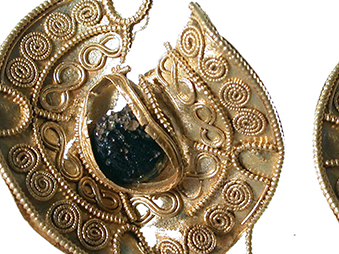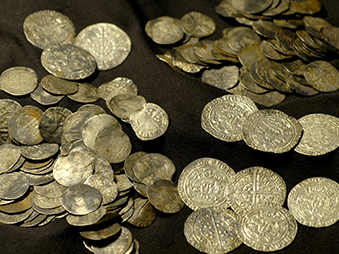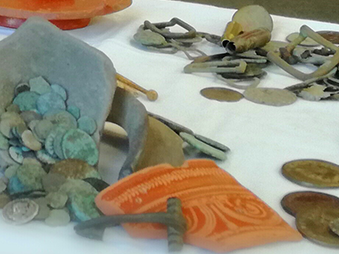Come and find out about new archaeological discoveries and cutting-edge research which is changing our understanding of Suffolk’s past. Archaeology experts present a series of talks about Roman coins, Anglo-Saxon cemeteries, Viking crafts in Ipswich, recent excavations at Rendlesham and Barnham...and more! Guests will also be able to view display stands and handle archaeological objects, with Suffolk County Council’s Finds Recording Team, Suffolk Institute of Archaeology and History and the National Council for Metal Detecting.
This is the first fundraising event to launch the Suffolk Archaeological Recording Foundation, a charity established to support the recording, analysis and conservation of archaeological objects in Suffolk found by members of the public. All proceeds from ticket sales will raise funds for the Suffolk Archaeological Recording Foundation to carry out their purposes.
"This event is a unique opportunity to hear from leading experts on extraordinary research on Suffolk’s archaeology, and recent significant discoveries made by local metal detector users – all of which is the type of activity that the foundation aspires to support in the future." - Lance Alexander, Chair of Trustees
The event is open to all and especially any members of the public who have an interest in history or archaeology of Suffolk. However, the content of the talks is designed for an adult reading level and may not be suitable for younger audiences.
When and Where
📅 When: Thursday 5th June 2025
🕚 Time: 10am-4pm (doors open 9:45am)
📍 Where: The Corn Exchange, King St, Ipswich, Suffolk, IP1 1DH
💰 Tickets: £20pp plus £3 booking fee. Booking Essential! (Ticket price includes complimentary tea and coffee. Lunch is NOT provided)
Book Tickets via Ipswich Theatres »
CONFERENCE PROGRAMME
Below is the schedule of talks.
9:45-10:15: Arrival with complimentary tea and coffee
10:15: Trustees' Opening Address - Launching the Suffolk Archaeological Recording Foundation
10:30: "Flint, fire and elephants: excavating Neanderthal archaeology in Suffolk" by Rob Davis (British Museum)
Suffolk has an exceptional Lower Palaeolithic record that is critical to understanding the early human occupation of northwest Europe. This talk will discuss the results of recent excavations at three Suffolk sites dating to 400,000 years ago that provide insights into the complex technology and social lives of early Neanderthal people.
11:10: "All Change! Coin loss in Roman Suffolk" by Andrew Brown (Ashmolean Museum University of Oxford)
Coinage forms an important component of the Roman economy and is often highlighted when considering the development of Roman Britain as a province. These small, portable objects carry social and political messages around the Roman world but are also often closely identifiable and therefore archaeologically useful. This paper will highlight how the recording of Roman coinage over the last few decades has changed our understanding of coin use and loss in Suffolk and the insight this provides for the wider Roman province.
11:40: "Lackford: revisiting an early Anglo-Saxon cremation cemetery in north-west Suffolk" by Jude Plouviez (Formerly Suffolk County Council Archaeological Service)
In 2015 and 2016 pottery and burnt bone was found after ploughing immediately south of a known cremation cemetery, previously excavated in the 1940s. A project co-ordinated by Suffolk County Council Archaeological Service analysed the new finds and also re-examined the earlier results to give us new information about life and death in the Lark valley in the fifth and sixth centuries.
12:00: "New insights into Suffolk's past: Pans, platters and mirrors" by Faye Minter and Anna Booth (Suffolk County Council Archaeological Service)
Thousands of archaeological objects are found every year by members of the public in Suffolk and recorded by the local Suffolk County Council Finds Recording Team via the Portable Antiquities Scheme. These discoveries include a small number of significant in situ finds and this presentation will focus on a few recent examples and the information revealed from excavating and retrieving not only the objects but their archaeological context.
12:20 - 13:15: Lunch Break (lunch not provided)
13:15: "Introduction to early medieval Ipswich" by Keith Wade (former County Archaeologist)
The excavation programme in Ipswich from 1974 to 1990 demonstrated that it is one of the earliest English towns established as a town in the early 8th century but with origins in the seventh century. The town's economy was based on international trade with the Frankish Kingdom and craft production, which was dominated by a pottery industry. It was settled by the Danes in the late 9th century and was a substantial town in 1066.
13:30: "Ipswich and the Vikings of Suffolk" by Ian Riddler (freelance finds specialist)
One of the remarkable aspects of the material culture of Ipswich is the presence of early Viking objects, including combs, gaming pieces, cordage toggles and other fascinating items. Looking at these objects and related finds from Suffolk, we can begin to understand the initial impact of the Scandinavians in the county.
14:00: "Rendlesham in Context" by Christopher Scull (Consultant Archaeologist and Honorary Professor University College London and Cardiff University)
The Suffolk County Council Rendlesham project has identified the early East Anglian royal centre mentioned by Bede, and set it within its wider and longer-term settlement landscapes. This presentation explores the significance of the archaeology both for understandings of early medieval England and longer-term settlement history, and considers the lessons for archaeological methods and approaches.
14:40: Break with complimentary tea and coffee
15:00: "Early Medieval coinage in East Anglia" by Rory Naismith (University of Cambridge)
This talk will provide an overview of how money and coinage evolved in East Anglia between the fifth and eleventh centuries. It will examine what coins circulated in the region, where and by whom they were made, and also how they were used as part of a complex, largely rural economy.
15:30: "New Evidence and a New Face from West Stow" by Stephanie Paull (West Stow Anglo-Saxon Village and Museum)
This talk shares how archaeological evidence and recent research supports the redating of West Stow Anglo-Saxon settlement and how a facial reconstruction has been used to help bring the past to life for visitors.
16:00: Ends
Venue Info and Facilities
Refreshments: Tea and coffee will be provided on arrival and during an afternoon break. Lunch is NOT provided.
Toilets: there are multiple toilets available at the venue including accessible toilets.
Wheelchair Access: the Corn Exchange entrance on King Street is street-level. A member of staff will be on hand to direct you to a lift to access the Grand Hall.
Wheelchair spaces: 4 wheelchairs spaces are provided at the sides of the front stalls. Customers purchasing wheelchair positions must attend with a wheelchair. We cannot accommodate walkers or temporarily place chairs in these spaces.
Hearing Loop: There is a new Bluetooth hearing loop system to the Grand Hall within the Corn Exchange. Please download the Sennheiser MobileConnect App (Android/Apple only) before you arrive, or speak to a member of staff when you get to the venue. Click here to download hearing loop instructions
How to get there
The Ipswich Corn Exchange is easy to find, located in the Ipswich town centre and with plenty of pay-and-display parking nearby.
Address: Corn Exchange, King Street, Ipswich, IP1 1DH
The entrance to the Corn Exchange is on King Street, behind the Town Hall.
By Car
There is no parking at the venue but plenty of pay-and-display parking nearby in the town. Please check individual car park tariffs and closing times carefully. For more parking information please visit www.ipswich.gov.uk/carparks
There are also two park-and-ride car parks, at London Road and Martlesham Heath. For more information about Park and Ride visit: https://www.firstbus.co.uk/norfolk-suffolk/plan-journey/ipswich-park-ride
By Train
Ipswich's train station is a 15 minute walk to the Corn Exchange. Trains connect at Ipswich from Lowestoft (via Wickham Market and Woodbridge), Cambridge (via Bury St Edmunds and Stowmarket), Felixstowe, Peterborough, Norwich and London. To see a map of the station stops visit: https://www.greateranglia.co.uk/travel-information/journey-planning/network-map
By Bus
There are a number of bus companies operating within and around Ipswich. Find bus timetables at SuffolkOnBoard.com https://www.suffolkonboard.com/buses/timetables/

